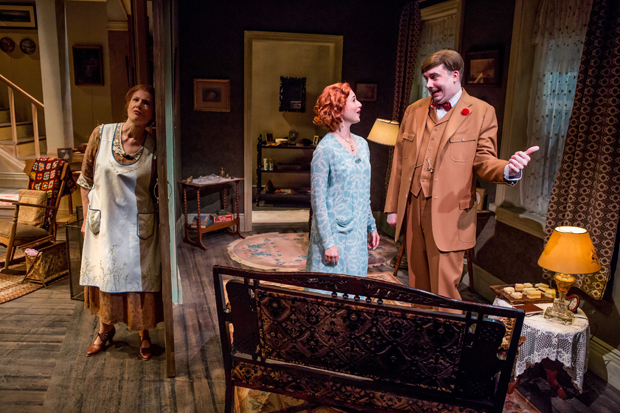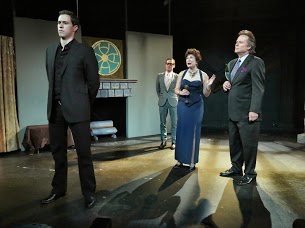By Beatrice Williams-Rude
The Potomac Theatre Project’s NYC season is underway at the Atlantic Theatre 2. Included is a double feature: “Judith: A Parting from the Body,” by Howard Barker and “Vinegar Tom,” by Caryl Churchill. These are works for thinking people, for those who enjoy analyzing and seeing parallels, for those with a knowledge of and interest in history. These are not pleasant plays, although they are intellectually exciting. Here is a review of the first.
Judith: “Mother of Israel”
“Judith: A Parting from the Body” is a new take on the Biblical tale of Judith and Holofernes. There are three characters, Judith, lovely and enigmatic; Holofernes, the power; and the servant/“ideologist” and at times, narrator.
Holofernes, played with steely precision by Alex Draper, engages in mind games with Judith, given a nuanced performance by Pamela J. Gray. The subject is death and the nature of love. Pay attention, theater-goers, you don’t want to miss any of the lines—they fly by and the concepts are weighty.
The servant, who provides comic relief, as well as context, is marvelously played by the delightful Patricia Buckley, some of whose droll observations call Patti LuPone to mind. Her monologue on judging the safety of a city by the movements of the camp followers—“the whores,” is hilarious. When there’s going to be an attack they flee ahead of the army. “They’re faster than the cavalry.” She goes on to explain that the whores know before the army does.
In another section it’s noted that our generals tell us we learn from our mistakes. Sound familiar?
Until Judith actually does it, we’re in doubt that this meek, docile widow will actually decapitate Holofernes. She had been silent, until engaged Holofernes, at which time her intelligence and cunning come to the fore. The Assyrian general and the Israelite widow focus on one another. What is it that they feel as opposed to what they say?
There are two examples of “absolute power corrupts absolutely.” We learn that Holofernes was a shy and frightened child and how he became a general. He reinvented himself and eliminated emotion and became a killing machine. Now, on the eve of battle, he wants to contemplate death. A theme of Tennessee Williams is that the opposite of death is desire. In this literate, thought-provoking work by Howard Barker, the early focus is so much on death and denial of desire there is a question of whether desire will ever manifest.
Holofernes keeps reiterating that he is unlovable. Obviously, he can command sex, or take it with brute force, but love is another matter. Does Judith, for one brief moment, love him?
After the decapitation Judith, here called “the Mother of Israel,” becomes a tyrant, demanding that the servant kiss her shoes.
Barker turns many of our preconceptions upside down—such as who is virtuous and who is vicious.
The play is intelligently and sensitively directed by Richard Romagnoli. Costume design is by Mira Veikley; Scenic design by Hallie Zieselman; Lighting by Mark Evancho; Sound by Cormac Bluestone.
It will run at the Atlantic Theatre 2, 330 West 16th Street, through August 9.
Photo : Stan Barouh























